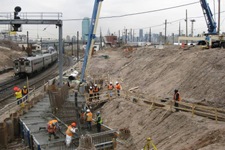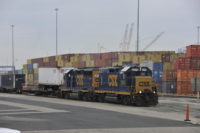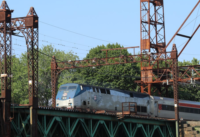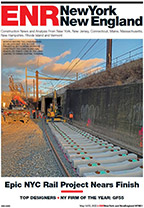
Rail projects on the Northeast Corridor are the major winners as the U.S. Dept. of Transportation redistributed $2 billion in high-speed rail aid that Florida rejected earlier this year.
The grant awards, announced by US DOT Secretary Ray LaHood on May 9, will include about $1.7 billion for infrastructure work. That will be a welcome infusion to engineering firms and construction contractors around the country, and ease the pain caused by Florida Gov. Rick Scott's decision to cancel high-speed rail plans in the Sunshine State.
But the $2-billion reallocation probably is DOT's last such competition for at least several months, because Congress cut all high-speed rail fund for the fiscal year ending Sept. 30. It also rescinded $400 million of the $2.4 billion that Scott, a Republican, turned down. That left $2 billion for DOT to reallocate.
The outlook for the high-speed rail program beyond 2011 is uncertain. It has been a signature transportation effort for the Obama administration, which has awarded $10.1 billion since 2009.
But congressional Republicans, particularly in the House, have made the rail program a particular target of their budget-cutting drive.
Still, demand for federal rail money exceeds supply. DOT selected the 16 winners--15 states plus Amtrak-- from more than 90 applications it received from 24 states, the District of Columbia and Amtrak.
The new batch of grants also marks the first time Amtrak was eligible to receive federal high-speed rail funds. The railroad scored big, winning the largest single grant in the round--$450 million for signal, track and catenary upgrades on a busy section of the Northeast corridor.
Another major Northeast Corridor grant went to New York--$295 million for further work to speed trains through the Harold Interlocking in New York City's borough of Queens.
The office of New York Gov. Andrew Cuomo (D) issued a release saying that the project would enable Amtrak trains a "direct path" through the interlocking, which it described as "the busiest passenger rail junction in the nation."
Other regions fared well, too. The Midwest was awarded $404 million, including $199.3 million to Michigan, with most of that amount to go for track and signal upgrades from Kalamazoo to Dearborn.
Illinois received $186.3 million for improvements between Dwight and Joliet.
In the West, California won $300 million for a 20-mile extension of its Central Valley project.
If the past is a guide, the funds won't actually be disbursed for months, because in many cases DOT will not obligate the money until the states work out formal agreements with the freight railroads, which own most of the track over which passenger rail service runs.
The exception will be the Northeast Corridor, which Amtrak owns. It thus should be able to get its projects going faster than those in other states.





Post a comment to this article
Report Abusive Comment